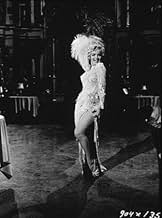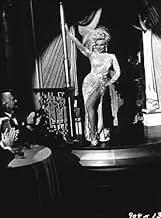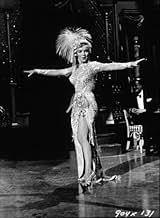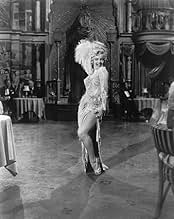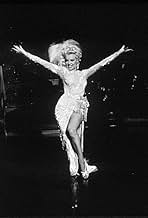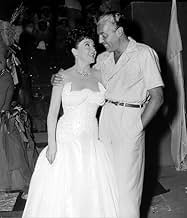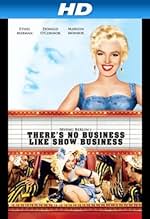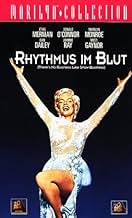VALUTAZIONE IMDb
6,4/10
7073
LA TUA VALUTAZIONE
Aggiungi una trama nella tua linguaMolly and Terry Donahue, plus their three children, are The Five Donahues. Son Tim meets hat-check girl Vicky and the family act begins to fall apart.Molly and Terry Donahue, plus their three children, are The Five Donahues. Son Tim meets hat-check girl Vicky and the family act begins to fall apart.Molly and Terry Donahue, plus their three children, are The Five Donahues. Son Tim meets hat-check girl Vicky and the family act begins to fall apart.
- Regia
- Sceneggiatura
- Star
- Candidato a 3 Oscar
- 4 candidature totali
Dorothy Abbott
- Showgirl
- (non citato nei titoli originali)
Dorothy Adams
- Nurse
- (non citato nei titoli originali)
Robert Adler
- Night Watchman
- (non citato nei titoli originali)
Aladdin
- Orchestra Violinist
- (non citato nei titoli originali)
Fred Aldrich
- Private Detective
- (non citato nei titoli originali)
Recensioni in evidenza
When Darryl F. Zanuck virtually forced exhibitors and most of his fellow studio mogul rivals to adopt CinemaScope as a panacea for TV's devastation of Hollywood's weekly box office bonanza, he dictated that virtually all of Twentieth's output was to be filmed in that eye-stretching process. "There's No Business Like Show Business," directed by that old pro, Walter Lang, seems to be the prime example of Darryl's minions saying to their boss: "You want wide? We'll give you W-I-D-E!!"
Everything about it was designed and lensed to emphasize the original ratio of the CinemaScope process and viewing it on a video that isn't letterboxed must look like what a one-eyed person must experience in everyday life. I never did see it in a theater but I have seen it on a TV broadcast which more-or-less recreated its widescreen ratio. It's a glorious mish-mash. Every Berlin tune that could be stuffed into it is given at least one run-through; John de Cuir's production design must have occupied every inch of several of Twentieth's West Los Angeles soundstages; Ethel Merman, after her terrific movie repeat of her Broadway success in "Call Me Madam" for Fox (and now, as of 2005, available on video), trumpets away in number after number (Must have been an ear-rending experience over those original four-track stereophonic sound systems.); Dan Dailey, Donald O'Connor and Mitzi Gaynor give it their energetic best; and then there's Marilyn. What can we say, with all that so sadly, in her personal life, came after she reluctantly fulfilled her contractual obligation in this one? She dazzles in, let's face it, a rather vulgar way, and seems shoehorned in to boost the potential box office. And they even added Johnnie Ray, a huge jukebox success at the time (and, due to his hearing deficiency, performing his songs at an even greater volume than La Merman.)
All in all this one shouldn't be missed if you want to view an example of Hollywood at its brassiest, in a production fairly bulging with elements that may not coalesce very harmoniously but which was, no doubt, worth the price of admission to those movie palaces before they were carved up to become the precursors of today's sterile multiplexes.
Everything about it was designed and lensed to emphasize the original ratio of the CinemaScope process and viewing it on a video that isn't letterboxed must look like what a one-eyed person must experience in everyday life. I never did see it in a theater but I have seen it on a TV broadcast which more-or-less recreated its widescreen ratio. It's a glorious mish-mash. Every Berlin tune that could be stuffed into it is given at least one run-through; John de Cuir's production design must have occupied every inch of several of Twentieth's West Los Angeles soundstages; Ethel Merman, after her terrific movie repeat of her Broadway success in "Call Me Madam" for Fox (and now, as of 2005, available on video), trumpets away in number after number (Must have been an ear-rending experience over those original four-track stereophonic sound systems.); Dan Dailey, Donald O'Connor and Mitzi Gaynor give it their energetic best; and then there's Marilyn. What can we say, with all that so sadly, in her personal life, came after she reluctantly fulfilled her contractual obligation in this one? She dazzles in, let's face it, a rather vulgar way, and seems shoehorned in to boost the potential box office. And they even added Johnnie Ray, a huge jukebox success at the time (and, due to his hearing deficiency, performing his songs at an even greater volume than La Merman.)
All in all this one shouldn't be missed if you want to view an example of Hollywood at its brassiest, in a production fairly bulging with elements that may not coalesce very harmoniously but which was, no doubt, worth the price of admission to those movie palaces before they were carved up to become the precursors of today's sterile multiplexes.
20th Century Fox was no match for MGM when it came to musicals. Daryl F. Zanuk decided to gamble with this film where the talents of a Broadway star, Ethel Merman, would be showcased. Ms. Merman in spite of being the toast of Broadway, never made it big in Hollywood. After all, she was not a radiant beauty, but oh, could she belt a song that could be heard at the top of the balcony! Phoebe and Henry Ephron were brought on board to write the screen treatment and Walter Lang directed.
The musical was also blessed in that Irving Berlin's music is heard throughout in all its glory. Ms. Merman was the perfect actress to interpret the songs written by Mr. Berlin. They made a perfect duo, even though, for some viewers not used to Ethel Merman's singing style, it might prove an uneasy combination.
The story is simple enough. It follows the Donahues from the early days of vaudeville through some glittering years after. Molly and Terence Donahue had two sons, Tim and Steve, and a daughter, Katy. As the children grow up, the parents' popularity began to recede. The film deals with Tim, as a young man, as he falls for Vicky Parker, a beautiful singer who makes it big on her own. Vickie, who is more interested in her own career neglects Tim. As a result, Tim goes on his own to find himself, away from his family and Vickie.
The best thing in the film is Ethel Merman. She was a legendary figure and as Molly Donahue, she is at her best. Dan Dailey was the perfect partner for Ms. Merman. Donald O'Connor is also seen doing some fine dancing. Marilyn Monroe was a lovely woman to look at. As a singer, she had a small voice, but she used it well making the songs her own. Mitzi Gaynor plays Katy. Johnnie Ray, a popular singer of that period is terribly miscast. His Steve is the worst thing in the movie.
Although predictable, this film has some great things going for it. Some of the musical numbers are well staged and will not disappoint. On the whole as the camaraderie expressed by the title of the film is evident in the musical.
The musical was also blessed in that Irving Berlin's music is heard throughout in all its glory. Ms. Merman was the perfect actress to interpret the songs written by Mr. Berlin. They made a perfect duo, even though, for some viewers not used to Ethel Merman's singing style, it might prove an uneasy combination.
The story is simple enough. It follows the Donahues from the early days of vaudeville through some glittering years after. Molly and Terence Donahue had two sons, Tim and Steve, and a daughter, Katy. As the children grow up, the parents' popularity began to recede. The film deals with Tim, as a young man, as he falls for Vicky Parker, a beautiful singer who makes it big on her own. Vickie, who is more interested in her own career neglects Tim. As a result, Tim goes on his own to find himself, away from his family and Vickie.
The best thing in the film is Ethel Merman. She was a legendary figure and as Molly Donahue, she is at her best. Dan Dailey was the perfect partner for Ms. Merman. Donald O'Connor is also seen doing some fine dancing. Marilyn Monroe was a lovely woman to look at. As a singer, she had a small voice, but she used it well making the songs her own. Mitzi Gaynor plays Katy. Johnnie Ray, a popular singer of that period is terribly miscast. His Steve is the worst thing in the movie.
Although predictable, this film has some great things going for it. Some of the musical numbers are well staged and will not disappoint. On the whole as the camaraderie expressed by the title of the film is evident in the musical.
this is a film for people who love big song and dance numbers (as well as Marilyn Monroe and Mitzi Gaynor fans). it almost is 'pre- reminiscent' of Bollywood in how it moves from one song to the next, with only the most meager connections between song and storyline. the storyline itself is thin enough, that in slow moments i was struck by how contrived the plot was. the purpose of this movie seemed to be to have several Irving Berlin songs choreographed into vaudeville-like song and dance numbers. what better way to do this than by following the lives of a couple of old vaudeville stars who met, married, had babies, and stayed on the road all the while. it all leads to the climactic scene (here's the spoiler, if this film can be said to have one) of ethel merman paying homage to herself and her role as Annie Oakley by singing 'there's no business like show business'. pay attention to how they managed to jigger the storyline such that ethel got her solo for that number (remembering that the family had five members plus a confounding love interest at that point, and the script writers had to somehow get all of them but ethel off the stage). another number, where johnny ray sings a gospel tune, has 'vehicle' written all over it. and as mentioned by the reviewer above, Marilyn Monroe was hot enough property that she was given two 'vehicle' numbers--although her character does not appear to have been penciled into an otherwise completed script, as suggested above. Marilyn's character is critical to the unfolding of the plot, such as it is. notice also how the script writers cleverly played upon Marilyn's reputation for a breathy, contrived diction.
so if you like BIG musicals with huge song and dance production numbers and little plot, this is for you (9 or 10 stars). if you do not, skip this one (1 or 2 stars, this is a bomb). averaged out to about a 6, but really more likely a 'love it' or 'hate it' movie. but then again . . .
there was something in the 'exposed ducts' construction that made me curious enough about how and why it was made the way it was, that i looked up the answers to many of my questions. were the songs composed specifically for this, or a jumble of odds and ends? (the latter). why was ethel merman given the climatic solo? (as mentioned, she was reprising a big number from her signature role as Annie Oakley in 'Annie Get Your Gun', which was one of the most successful Broadway shows ever at the time). who was that guy who played Steve Donahue, and please explain the strange juxtaposition of his commanding stage presence when singing, and that effete concealment of androgyny when not--as well as the 'cast-to-type' plot twist that sends him into the clergy . . . ? (look up a biography of johnny ray). so, if you want a peek into the movie-making process at the tail end of the studio-system era, this movie has a barely concealed super-structure that reveals how a hoped-for 'blockbuster' was constructed in those days.
so if you like BIG musicals with huge song and dance production numbers and little plot, this is for you (9 or 10 stars). if you do not, skip this one (1 or 2 stars, this is a bomb). averaged out to about a 6, but really more likely a 'love it' or 'hate it' movie. but then again . . .
there was something in the 'exposed ducts' construction that made me curious enough about how and why it was made the way it was, that i looked up the answers to many of my questions. were the songs composed specifically for this, or a jumble of odds and ends? (the latter). why was ethel merman given the climatic solo? (as mentioned, she was reprising a big number from her signature role as Annie Oakley in 'Annie Get Your Gun', which was one of the most successful Broadway shows ever at the time). who was that guy who played Steve Donahue, and please explain the strange juxtaposition of his commanding stage presence when singing, and that effete concealment of androgyny when not--as well as the 'cast-to-type' plot twist that sends him into the clergy . . . ? (look up a biography of johnny ray). so, if you want a peek into the movie-making process at the tail end of the studio-system era, this movie has a barely concealed super-structure that reveals how a hoped-for 'blockbuster' was constructed in those days.
There's No Business Like Show Business has the distinction of being the last of the Irving Berlin songbook musicals filmed. It came out the same year as White Christmas, also of the same genre.
Take a listen to the background music of films like Holiday Inn, Blue Skies, Alexander's Ragtime Band, and this one. I defy you to find one non-Berlin note in the film and that's no accident. The more songs of Irving Berlin used, the more money he made. He was one shrewd businessman Irving, most of the time.
The title song is identified with Ethel Merman and it was introduced in Annie Get Your Gun. Merman like Mary Martin had a conspicuous lack of success in Hollywood as much as she was an icon on Broadway. She only did the screen version of two of her Broadway hits, Anything Goes and Call Me Madam. That's two more than Mary Martin did.
Anyway, I think the genesis of There's No Business Like Show Business probably came about when Call Me Madam became such a hit and the movie money people saw how the chemistry was between her and Donald O'Connor. So O'Connor was signed to play one of her three children. The other two children were Johnnie Ray and Mitzi Gaynor.
The plot such as it is, is the story of the Donahue family between both World Wars. The father of the aforementioned children is Dan Dailey and he and Merman do some good Irving Berlin numbers together. I've always marvelled at how graceful Dan Dailey moved on the screen in his musical films. He was not a creative sort in the same way Fred Astaire or Gene Kelly were. Probably if he had been, his reputation would be higher today. But he was a pleasing entertainer every time you saw him.
By all accounts it wasn't a happy film for Ethel. Marilyn Monroe is in the film and Ethel was jealous of her. Not that Monroe wasn't her usual difficult self. Probably that helped the plot because it does call for the two to be at odds. Merman believes that Monroe has led Donald O'Connor astray.
Mitzi Gaynor was a wonderful talent as well. Too bad she wasn't born twenty years earlier, what a big star she would have been in the thirties and forties in Hollywood musicals then. Good singer and one fabulous dancer.
The plot does get kind of sticky in spots and Johnnie Ray didn't set the screen on fire when he wasn't singing. No accident he didn't become a film star.
Still for those of us who bless the day Irving Berlin put down his first notes of an original song, it's worth watching.
Take a listen to the background music of films like Holiday Inn, Blue Skies, Alexander's Ragtime Band, and this one. I defy you to find one non-Berlin note in the film and that's no accident. The more songs of Irving Berlin used, the more money he made. He was one shrewd businessman Irving, most of the time.
The title song is identified with Ethel Merman and it was introduced in Annie Get Your Gun. Merman like Mary Martin had a conspicuous lack of success in Hollywood as much as she was an icon on Broadway. She only did the screen version of two of her Broadway hits, Anything Goes and Call Me Madam. That's two more than Mary Martin did.
Anyway, I think the genesis of There's No Business Like Show Business probably came about when Call Me Madam became such a hit and the movie money people saw how the chemistry was between her and Donald O'Connor. So O'Connor was signed to play one of her three children. The other two children were Johnnie Ray and Mitzi Gaynor.
The plot such as it is, is the story of the Donahue family between both World Wars. The father of the aforementioned children is Dan Dailey and he and Merman do some good Irving Berlin numbers together. I've always marvelled at how graceful Dan Dailey moved on the screen in his musical films. He was not a creative sort in the same way Fred Astaire or Gene Kelly were. Probably if he had been, his reputation would be higher today. But he was a pleasing entertainer every time you saw him.
By all accounts it wasn't a happy film for Ethel. Marilyn Monroe is in the film and Ethel was jealous of her. Not that Monroe wasn't her usual difficult self. Probably that helped the plot because it does call for the two to be at odds. Merman believes that Monroe has led Donald O'Connor astray.
Mitzi Gaynor was a wonderful talent as well. Too bad she wasn't born twenty years earlier, what a big star she would have been in the thirties and forties in Hollywood musicals then. Good singer and one fabulous dancer.
The plot does get kind of sticky in spots and Johnnie Ray didn't set the screen on fire when he wasn't singing. No accident he didn't become a film star.
Still for those of us who bless the day Irving Berlin put down his first notes of an original song, it's worth watching.
There are two main types of musicals--those where the emphasis is clearly on the music and others where the music is incidental to the story. While which style you like is up to you, for me, I much prefer those with less music--where the story is predominant. So, because of my personal preference, movies like "There's No Business Like Show Business" are NOT exactly my cup of tea, so to speak.
The film is about a fictional show business family, the Donohues. When the film begins, the three children are young. But then through the miracle of movie magic, soon about 15-20 years pass--and the children are now grown (and include Donald O'Connor and Mitzi Gaynor). Oddly, the parents, Dan Dailey and Ethel Merman, didn't seem to age a day. Even more noticeable is Marilyn Monroe--you see her early in the film and after all those years she looks as if she hasn't aged a day. Even if it was only 10 years--still, she looked EXACTLY the same! While the film follows the family with their ups and downs (and the third child when he decides to become a priest), all of it seems to be there just to provide a chance to sing and dance...a lot. Many of the songs are very familiar. Overall, very glossy and enjoyable if all you want is lots of singing and dancing...which I didn't. Watchable for a guy like me, but only just, as the story didn't seem strong enough to handle all the songs.
The film is about a fictional show business family, the Donohues. When the film begins, the three children are young. But then through the miracle of movie magic, soon about 15-20 years pass--and the children are now grown (and include Donald O'Connor and Mitzi Gaynor). Oddly, the parents, Dan Dailey and Ethel Merman, didn't seem to age a day. Even more noticeable is Marilyn Monroe--you see her early in the film and after all those years she looks as if she hasn't aged a day. Even if it was only 10 years--still, she looked EXACTLY the same! While the film follows the family with their ups and downs (and the third child when he decides to become a priest), all of it seems to be there just to provide a chance to sing and dance...a lot. Many of the songs are very familiar. Overall, very glossy and enjoyable if all you want is lots of singing and dancing...which I didn't. Watchable for a guy like me, but only just, as the story didn't seem strong enough to handle all the songs.
Lo sapevi?
- QuizOne day, Marilyn Monroe's husband, Joe DiMaggio, visited the set. He refused to be photographed with Monroe, but insisted on being photographed with Ethel Merman, whom he called "my favorite star."
- BlooperDuring the "Heat Wave" number, Marilyn Monroe accidentally pokes her finger in the eye of a dancer standing between the branches of a prop tree.
- Citazioni
Molly Donahue: "Don't worry." Hmm. That's a laugh. You start worrying about your kids the day they're born and you never stop. Even after they bury you, I bet you never stop.
- ConnessioniFeatured in Marilyn (1963)
- Colonne sonoreWhen the Midnight Choo-Choo Leaves for Alabam'
(uncredited)
Written by Irving Berlin
Performed by Ethel Merman and Dan Dailey
Later performed by Mitzi Gaynor and Donald O'Connor
I più visti
Accedi per valutare e creare un elenco di titoli salvati per ottenere consigli personalizzati
- How long is There's No Business Like Show Business?Powered by Alexa
Dettagli
- Data di uscita
- Paese di origine
- Lingue
- Celebre anche come
- El mundo de la fantasía
- Luoghi delle riprese
- Azienda produttrice
- Vedi altri crediti dell’azienda su IMDbPro
Botteghino
- Lordo in tutto il mondo
- 6341 USD
- Tempo di esecuzione1 ora 57 minuti
- Colore
- Proporzioni
- 2.55 : 1
Contribuisci a questa pagina
Suggerisci una modifica o aggiungi i contenuti mancanti



